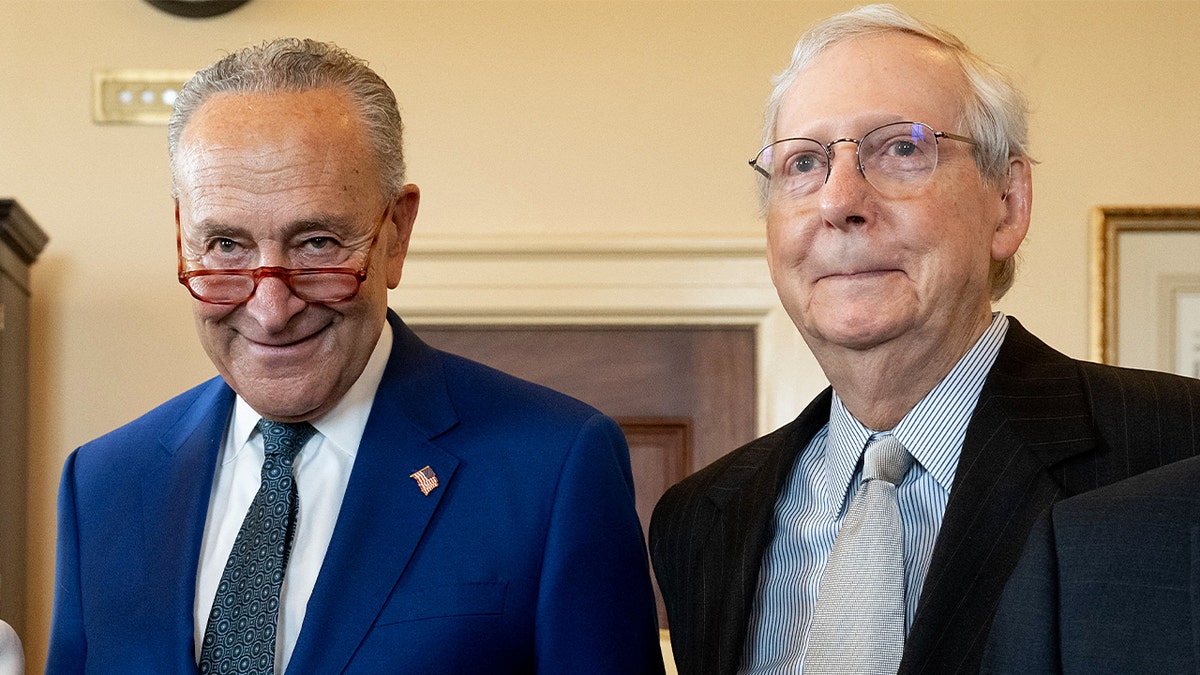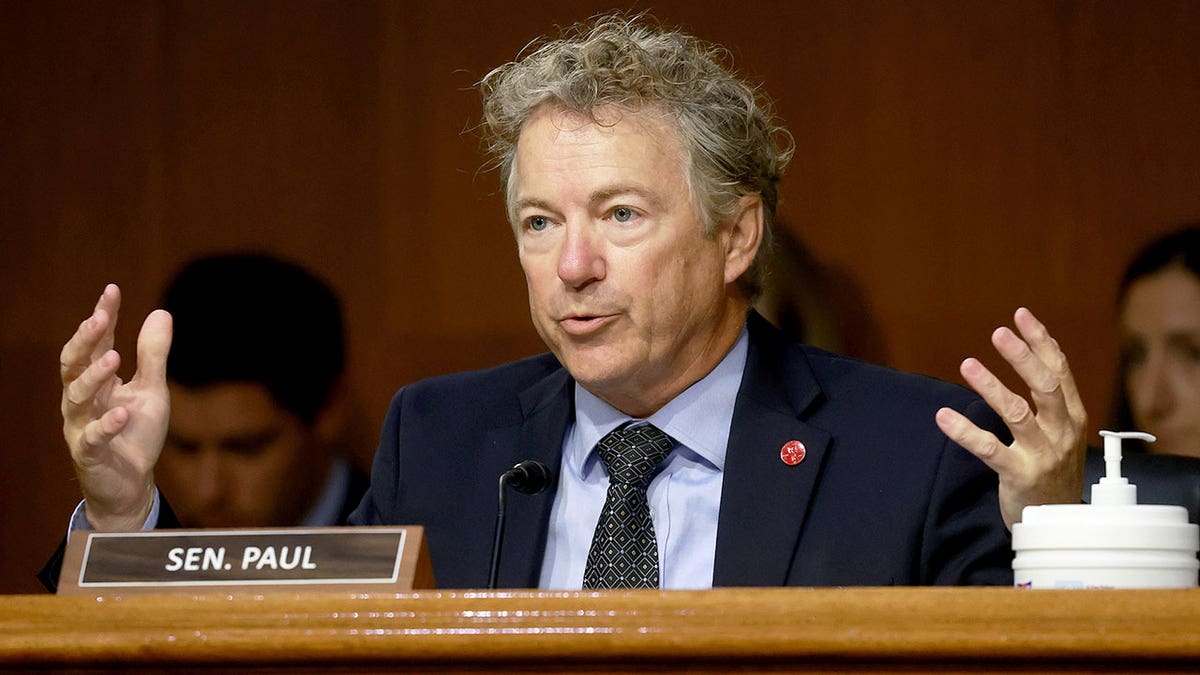Senate passes $95.3B foreign aid package 70-29
Fox News' Chad Pergram reports the latest on the bill's passage.
The Senate passed a $95 billion national security supplemental package to assist Ukraine, Israel and the Indo-Pacific after a tedious procedural process that came to an end early Tuesday morning.
The final vote was 70 to 29, with 22 Republicans voting yes. Democratic Sens. Peter Welch and Jeff Merkley, plus independent Sen. Bernie Sanders, voted no.
The supplemental package does not include any border security provisions and comes as the national debt soars above $34 trillion. Calls to offset the spending with cuts elsewhere went unheeded. Several Republicans spent hours — since the beginning of the weekend — collectively filibustering the package on the Senate floor. Sen. Mike Lee, R-Utah, committed to filibustering the bill for four hours on Saturday and continued early Tuesday.
The package includes $60 billion for Ukraine, $14 billion for Israel, $9 billion in humanitarian assistance for Gaza and nearly $5 billion for the Indo-Pacific. Democrats brought the package up for a vote after Republicans had blocked the $118 billion package that also included numerous border and immigration provisions — negotiated by a group of bipartisan senators and Biden officials — last Wednesday.
U.S. NATIONAL DEBT TRACKER: SEE WHAT AMERICAN TAXPAYERS (YOU) OWE IN REAL TIME
The U.S. has already spent more than $100 billion in aid for Ukraine since its war against Russia began in Feb. 2022.

Senate Majority Leader Chuck Schumer (L), Democrat of New York; and Senate Minority Leader Mitch McConnell, Republican of Kentucky, pose for a photo before a meeting with Italian Prime Minister Giorgia Meloni at the U.S. Capitol in Washington, D.C., prior to a meeting on July 27, 2023. (Saul Loeb)
"I applaud the bipartisan coalition of Senators who came together to advance this agreement, and I urge the House to move on this with urgency. We cannot afford to wait any longer," President Joe Biden said in a statement Tuesday. "The costs of inaction are rising every day, especially in Ukraine. Already, we are seeing reports of Ukrainian troops running out of ammunition on the front lines as Russian forces continue to attack and Putin continues to dream of subjugating the Ukrainian people. There are those who say American leadership and our alliances and partnerships with countries around the world do not matter. They do. If we do not stand against tyrants who seek to conquer or carve up their neighbors' territory, the consequences for America's national security will be significant."
In a press conference Tuesday morning, Sen. Majority Leader Chuck Schumer, D-N.Y. praised the package as "one of the most historic and consequential bills" to ever pass in the upper chamber.
"The responsibility now falls on Speaker [Mike] Johnson, and House Republicans to approve this bill swiftly," Schumer said. "And I call on speaker Johnson to rise to the occasion to do the right thing."
However, a showdown between the two chambers is on the horizon, as Speaker Johnson, R-La., said in a statement Monday evening the House would not pass the Senate's foreign aid package, but instead draft their own bill with border security provisions included.
"The mandate of national security supplemental legislation was to secure America’s own border before sending additional foreign aid around the world," Johnson said. "It is what the American people demand and deserve. Now, in the absence of having received any single border policy change from the Senate, the House will have to continue to work its own will on these important matters. America deserves better than the Senate’s status quo."
On Monday, a number of GOP senators were optimistic about a breakthrough to have their amendments addressed, primarily focused on stringent border security measures. However, none of the amendments were brought forward for consideration due to neither party agreeing to the list of filed amendments.
Sen. Ted Cruz, R-Texas, introduced an amendment identical to the House's immigration bill, H.R. 2, which would restore most Trump-era restrictions, hire additional border patrol officers and tighten asylum screenings.
SENATE REPUBLICANS PREPARE FOR LONG HAUL IN FIGHT OVER UKRAINE, ISRAEL AID

Sen. Rand Paul speaks during the COVID Federal Response Hearing on Capitol Hill on June 16, 2022, in Washington, D.C. (Joe Raedle)
Sen. Rand Paul, R-Ky., a hawkish figure against continued aid to Ukraine, said on the floor before the final vote on Monday that the bill "gives the finger to American taxpayers."
"This bill gives the finger to all of America — this bill is Ukraine first, America last," he said.
Republican Sens. Roger Marshall, JD Vance, and Josh Hawley were just a few other senators who spoke in opposition to the bill on Monday, continuing the filibuster. Meanwhile, GOP Sens. Mitt Romney and Thom Tillis were just a few who urged their colleagues to "delay" no further and pass the package.
Republican Sen. Jerry Moran of Kansas became emotional in a floor speech in support of the bill.
"I believe in America first, but unfortunately America first means we have to engage in the world," Moran said.
Which Republicans voted yes on the foreign aid bill?
– John Boozman
– Shelley Moore Capito
– Bill Cassidy
– Susan Collins
– John Cornyn
– Kevin Cramer
– Mike Crapo
– Joni Ernst
– Chuck Grassley
– John Hoeven
– John Kennedy
– Mitch McConnell
– Jerry Moran
– Lisa Murkowski
– James Risch
– Mitt Romney
– Mike Rounds
– Dan Sullivan
– John Thune
– Thom Tillis
– Roger Wicker
– Todd Young
Democrats brought the package up for a vote after Republicans had blocked the $118 billion package that also included a slew of border and immigration provisions on Wednesday. Republicans had previously said they would not approve funding for Ukraine unless the overwhelmed southern border was secured first.
Conservatives joined with some liberal Democrats in shutting down the bill, so Schumer prepared a vote on the $95 billion foreign aid package without the border package as a backup plan.
PENTAGON FINALLY RUNS OUT OF MONEY FOR UKRAINE, URGES 50 ALLIES TO CONTINUE SUPPORTING KYIV

President Biden welcomes Ukraine's President Volodymyr Zelenskyy on the South Lawn at the White House in Washington, Dec. 21, 2022. (REUTERS/Kevin Lamarque )
Republican Minority Leader Mitch McConnell had backed funding for Ukraine, but drew criticism from party members who urged lawmakers not to pass foreign aid without securing the border first.
"I know it’s become quite fashionable in some circles to disregard the global interests we have as a global power, to bemoan the responsibilities of global leadership," McConnell said on the floor on Super Bowl Sunday. "To lament the commitment that has underpinned the longest drought of great power conflict in human history — this is idle work for idle minds, and it has no place in the United States Senate."
CLICK HERE TO GET THE FOX NEWS APP
Schumer said Monday the package is "a down payment for the survival of Western democracy and the survival of American values."
The White House requested the supplemental funding package in October, but it was held up by Republicans who wanted more measures to fix the record-setting border crisis, including greater limits on asylum and limits on releases into the interior. Negotiators worked for months and last weekend finally released their text.
In addition to the foreign aid package, the failed border package included an "emergency border authority" to mandate Title 42-style expulsions of migrants when migration levels exceed 5,000 a day over a seven-day rolling average.





















